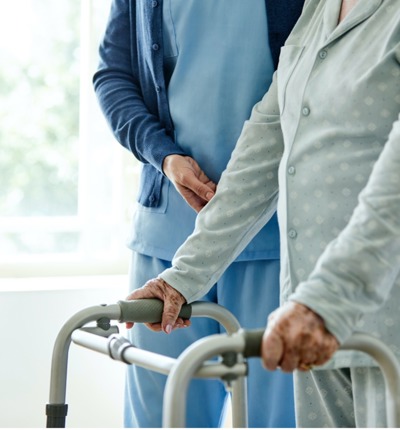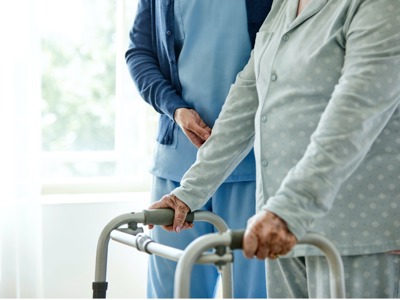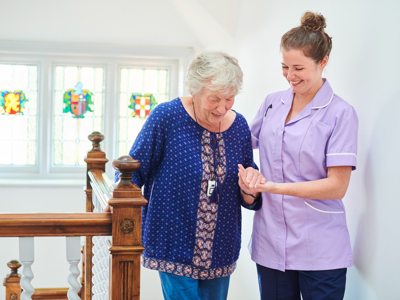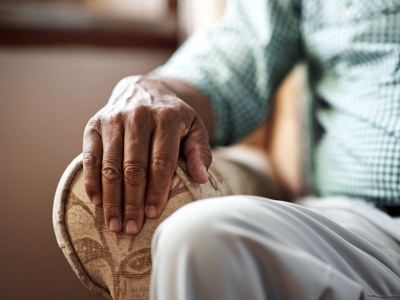
John’s Campaign response to further updates to government visits-out guidance for care homes
Following announcement of the launch of a legal challenge by John’s Campaign which prompted a public outcry over the Easter weekend, an age requirement has been dropped from government guidance on visits out for people living in care homes.
Posted on 08 April 2021
The Department of Health and Social Care (DHSC) this week published an update to new guidance it had issued 8 March 2021, which no longer restricts visits out to those residents of working age.
However, the document still includes a requirement for residents who do take visits out of their care home to self-isolate for 14 days on their return, regardless of the type of visit. John’s Campaign will continue to press the DHSC to remove this element, which the DHSC itself has recognised “is likely to mean that many residents will not wish to make a visit out of the home.”
Since the launch of John’s Campaign’s legal challenge to the 8 March guidance hit the national news over Easter weekend, co-founders Julia Jones and Nicci Gerrard have been overwhelmed by calls from people whose loved ones are badly affected by the guidance.
They spoke of their anger and heartbreak at being separated from loved ones, many of whom have chosen to move into care homes, but now, despite being fully vaccinated, have no hope of visits out to see their families and friends or even for a walk in the park.
Those who have contacted Julia and co-director Nicci Gerrard include: (names have been changed)
- Jane, whose 83-year-old father Reg decided to move to a care home to avoid feeling isolated and vulnerable at home. He has not been allowed to go out or visit his family in over 12 months. Jane is not even allowed to take him out for a walk in his wheelchair, even though she is regularly tested at work and in the care home and Reg has had Covid and has been vaccinated.
Jane said:
“My dad cannot live with the threat that if he wants to be taken out for a walk in the park, he then has to stay isolated in his room for two weeks. The risk of being isolated is too much, he can’t cope with the isolation period. The days are long and hard enough as it is. He’s done it before with Covid and he doesn’t want to experience the severity of the isolation and loneliness he felt for 14 days on his own, so he doesn’t have a choice, there is no choice. He’s disheartened. He feels completely separated from regular life. The reality of his situation is one of loneliness and isolation and of no outlook. He lives in a home where he has caught Covid already but the hardest part is that he has nothing to look forward to. He keeps saying “I just want to get out”. He doesn’t have an en-suite room so when he previously had to self-isolate he had to use a commode in the room. It’s just so dire.”
- Dana and Tom, whose 30-year-old son Robert has autism and lives in a care home: Robert’s care plan makes provision for regular outings and time together with his parents but that is no longer possible. His parents can’t visit because of the distress this causes Robert who can’t understand why he is not allowed to go home with them like he used to. Robert has had two vaccinations and so has everyone in the care home. His parents undergo regular testing but they still can’t take him out of the care home without him facing 14 days of self-isolation on return.
Dana said:
“Robert would never be able to do 14 days isolation. He wouldn’t be able to comprehend it.
I hate lying to Robert every night, asking if he can do a couple more days for me. He says “I am being good mum but when am I coming home?”. We desperately miss him and feel as parents that all of our rights and Robert’s rights have been taken away, it’s like we don’t have any.”
- Dorothy, who would like to wheel her mum who is in a wheelchair to a little park area across from the care home, to get some fresh air and see the flowers, but facing self-isolation on return makes this impossible.
Dorothy said:
“I wouldn’t go near any human being and I wouldn’t want my mum to be. I have been so careful.
“Mum’s dementia hadn’t progressed too much before the pandemic, she was very verbal, but now that has more or less gone. I know people say that would have happened anyway, but its progressed so much because she’s been denied the opportunity to engage with people and other external things.”
- Michael, who has seen his mother struggle with isolation during the pandemic. Every resident in her care home except one has had two vaccinations. His family have been vaccinated too. Yet it is not possible for them to take his mum to the park or see her in their garden at home for a lunch.
Michael said:
“I'm at my wits’ end with these outrageous deprivations of liberty and mental abuse of entirely innocent and powerless people. I asked my mother what she wanted for Christmas and she said she didn’t want anything but to come to visit me and my family.”
John’s Campaign, which has campaigned for the rights of families and care homes residents throughout the Covid-19 pandemic, sent a pre-action protocol letter to the DHSC over the 8 March guidance to say that the imposition of a blanket ban on visits out, and the failure to communicate and ensure individualised risk assessments are taken for every resident who wishes to make a visit out, is unlawful.
The letter also questioned the requirement for self-isolation on return for 14 days. Since care homes now have rapid testing, designated visitors are permitted, and residents are vaccinated, this is unnecessary, say John’s Campaign. It is also at odds with reduced self-isolation requirements in other contexts such as after travel abroad.
Individualised risk assessments, which take account of an individual resident’s specific characteristics and needs are necessary in all circumstances according to the Equality Act 2010, Human Rights Act 1998 and Care Act 2014 and should also inform decisions in relation to self-isolation requirements.
Julia Jones said:
“I find myself amazed at the government's callous acknowledgement that obliging people to self-isolate for 14 days after a trip out will deter people from leaving the 'homes' where they have been stranded for over a year. There is no logic to this - care staff come in and out every day with no restriction on their community interactions. Young men and women with learning disability or autism are being denied the opportunities guaranteed in their care plans and older residents are missing the sweetness of the outside world during the last years of their lives. This seems massively discriminatory and a contravention of Article 5 of the HRA - particularly for people with full mental capacity who have not given their consent to this form of detention.”
John’s Campaign is represented by Tessa Gregory and Carolin Ott of Leigh Day.
Tessa Gregory said:
“It cannot be right that every time a resident leaves their care home, regardless of the nature of the outing, regardless of who they are seeing, regardless of the precautions being taken and whether or not they have been vaccinated, that they then be required to self-isolate for 14 days on their return. The Government needs to urgently act and amend the guidance to enable care homes to take a more nuanced, sensible approach on much needed visits out.”

John's Campaign issues challenge to 'blanket ban' approach on care home visits in higher risk areas
John's Campaign, a group which campaigns for people with dementia to be supported by family carers, has issued urgent court proceedings challenging the Department of Health and Social Care (DHSC) guidance for visiting in care homes (“the Guidance”).

Group launches legal challenge to guidance on care homes
Campaigners credited with changing the government's mind on care home visiting during the COVID-19 pandemic are challenging guidance on residents' trips out, including over Christmas.

Campaigners challenge blanket ban on care homes residents’ visits out
Campaign group John’s Campaign has launched a legal challenge against the Department of Health and Social Care regarding a blanket ban on visits out of care homes by residents aged over 65 and the requirement for those who are permitted to leave the care home to self-isolate for 14 days on their return.



